Looking for the best nontoxic rugs to cozy up your home? We’ve got you covered! So get ready to ditch those chemical-laden floor coverings that make our nose wrinkle with our list of sustainable rugs below.
Your home is a safe space for you and your family. You are conscious of the furnishings you place in your home; why should a rug be any different? But unfortunately, many rugs are manufactured with harmful chemicals and toxic dyes, which can be detrimental to your health. On top of that, a large number of rugs are made in environments with little worker protections and poor working conditions.
In fact, the report, Tainted Carpets: Slavery and Child Labor in India’s Hand-Made Carpet Sector, documents over 3,200 cases across nine states in India and finds several hundred cases, each, of forced labor, bonded labor, child labor, and human trafficking, at carpet factories run by exporters who ship these rugs to some of the biggest retail stores in the U.S.
Want us to name-drop? Macy’s, Bloomingdale’s, Neiman Marcus, Target, Williams-Sonoma, Pottery Barn, and IKEA, amongst others.
For this guide, we have brought together some of the best sustainable rug brands creating nontoxic rug options for your home. From organic cotton rugs made in the USA to ethical rugs hand-crafted by artisans worldwide, the options are all in your favour.
Let’s take a look.
8 Best Non Toxic and Sustainable Rugs
We’re reader-supported. The following post contains affiliate links. If you click through a link and make a purchase, we may receive a commission. We only partner with brands who share the same values as we do.
1. Citizenry
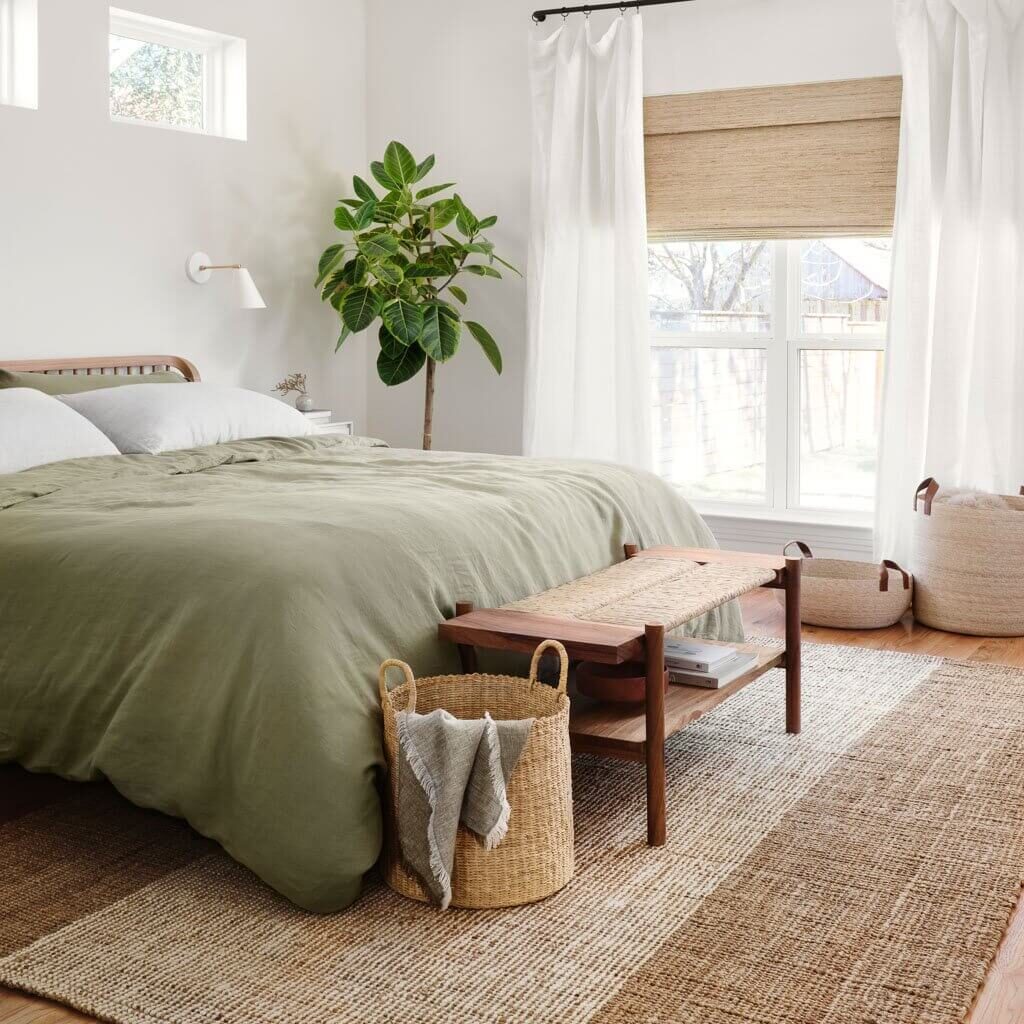
Sustainability: Small batch, hand-crafted rugs supporting artisans all over the world. They are committed to providing fair wages and sustainable funding back to suppliers.
Price: Starting from $150
Citizenry showcases the best artisanal rugs from all over the world. Their nontoxic rugs are hand-crafted in small batches by local businesses, often using ancient techniques. Citizenry is committed to providing fair trade standards, fair wages, and safe working environments for its artisan partners.
They have curated a range of sustainable rug options, using natural fibers, such as jute, in contemporary designs, which will stand out in your home while being safe for you and your family.
2. Ruggable
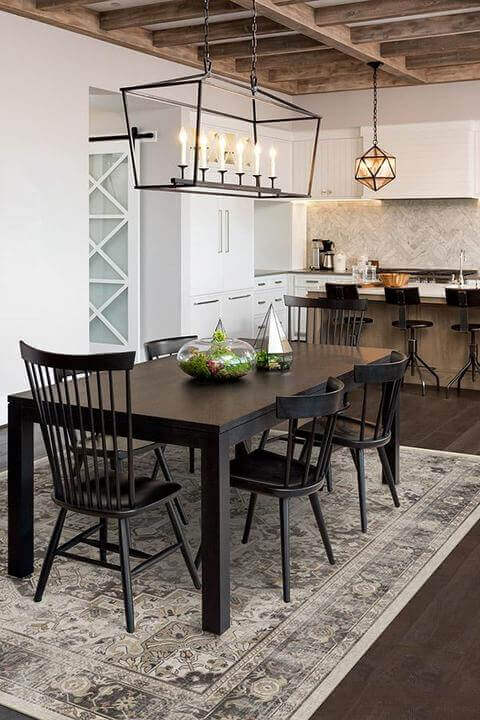
Sustainability: Made to order rugs, which reduces waste. No toxic chemicals are used to treat rugs.
Price: Starting from $90
f you have children and pets, you know you need a sustainable rug that can adapt to your lifestyle. Ruggable produces washable, nontoxic rugs, which are perfect for those spills and mishaps.
Their rugs come in 2 parts, the first is a non-slip underlay, and the second is the detachable, washable rug topper, which comes in an array of designs to suit your home.
Ruggable consciously produces their rugs to order, which reduces waste. They also don’t chemically treat their rugs, making them safe for both people and pets.
3. Burrow

Sustainability: Rugs are designed with natural and recycled materials from ethical suppliers.
Price: Starting from $395
Burrow has made it easy to choose a rug perfect for your home. They have a selection of non-toxic rugs, which feature designs to suit everyone, from timeless classics to bold statements.
They use natural materials and recycled fibers to produce their rugs, which are made ethically in India. Their collection includes pet-friendly, stain-resistant mats that are easy to clean with a low shed design. Burrow offers free shipping on orders.
4. Nordic Knots
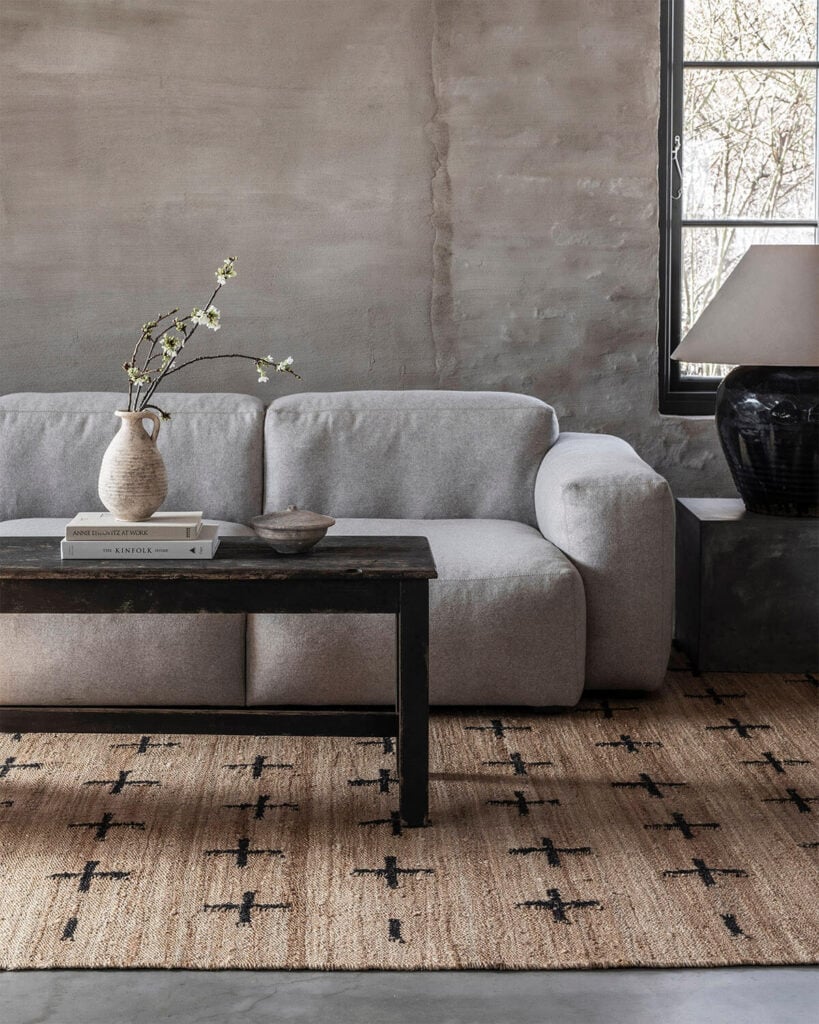
Sustainability: Rugs produced by Goodweave™ Certified weavers – working to end child labor practices in carpet weaving communities worldwide.
Price: Starting from $195
Lauded as one of the best sustainable rug brands of the last year, Nordic Knots is a Scandinavian design company that brings you modern, minimalist rugs with functional practicality. Their classic Danish aesthetic extends to their natural jute and flat-woven rugs, which would accentuate your interior and compliment your home.
All of their nontoxic rugs are Goodweave™ certified and produced in small limited batches. This certification means no child, forced, or bonded labor is used to make their products.
5. Organic Weave

Sustainability: Non toxic rugs produced with the Goodweave™ certification, produced with GOTS certified materials.
Price: Starting from $300
Organic Weave is a specialist in nontoxic, organic rugs for your home. They only use GOTS-certified organic cotton and wool and never use any harmful dyes or chemicals, including nontoxic glue.
They have a range of styles, from hand-tufted wool to cotton flat-weave, including a selection of organic cotton rugs perfect for children.
They offer custom-made nontoxic rugs and also provide free shipping on all orders to the U.S.
6. Lorena Canals
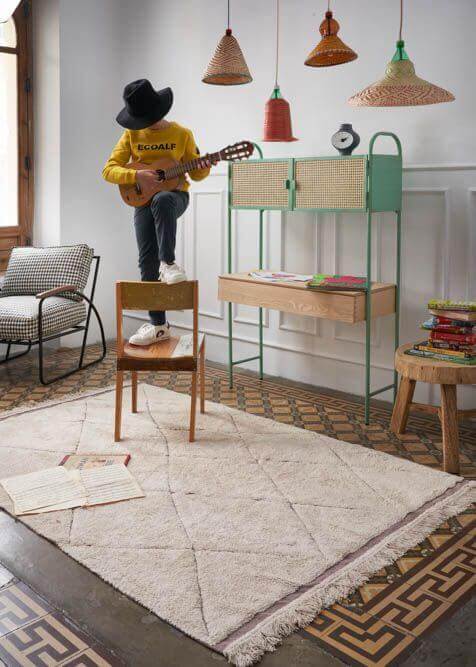
Sustainability: The Rugcycled collection recycles old rugs, uses all-natural materials such as wool, un-dyed cotton, and recycled yarn.
Price: Starting from $50
Lorena Canals are a household name for their stylish, durable, and washable rugs. They have been creating their signature collections for over 15 years and have recently extended their natural, non-toxic range to include the world’s first washable rug collection.
We love their Rugcycle program, which recycles old rugs, re-crafting them into modern pieces which will be adored for years to come.
7. West Elm
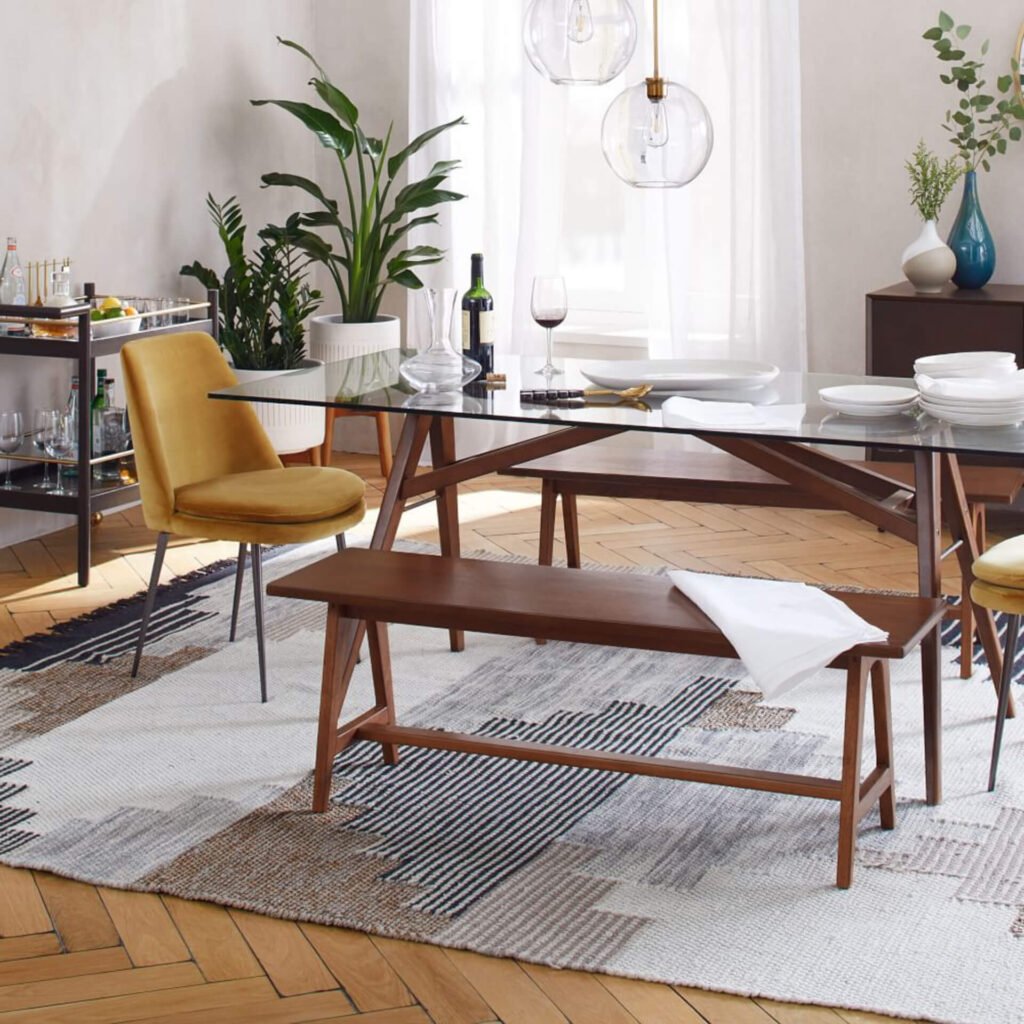
Sustainability: Fair Trade certified factories
Price: Small rugs start at $30
Despite West Elm being a large company, we include them here because their investment in sustainable sourcing, building an ethical supply chain, and using non-toxic materials and dyes is impressive. In addition, they’ve ranked on Barron’s 100 Most Sustainable U.S Companies for four years in a row, which is an excellent sign.
They’ve paid over $2 million in Fair Trade community development funds and work with Fair Trade Certified factories.
Many of their rugs are hand-crafted to Nest standards, a program designed to address and improve supply chains and working conditions worldwide.
West Elm makes various rugs from 100% natural materials, including Jute, wool, and cotton. You can see each rug’s sustainability rating with details on the factories, country of origin, and much more.
8. Kubel Design

Sustainability: Knitted from recycled cotton thread without the use of harmful chemicals and dyes.
Price: Starting from $900
Kubel Design hand-craft their stunning, natural, eco friendly rugs in the heart of the Abruzzo region of Italy.
Great artists inspire designs, and each rug is a piece of art for your home. Rugs are knitted by hand and can be customizable and tailored to your home.
Recycled and natural cotton with no toxic chemicals or dyes is used to produce their rugs, with responsible production being the top of Kubel Design’s agenda.
9. Zuahaza

Sustainability: Natural fiber, hand woven using traditional processes, all natural and non-toxic dyes.
Price: Starting from $198, prices increase depending on size and pattern
Zuahaza’s rugs – such as the Bogota area rug (pictured) – are handwoven by a family of artisans in Santander, Columbia on vertical looms, in a process that can take up to two weeks thanks to the level of care and detail applied.
The material is a 100% natural fique, which is a strong, durable, and natural fiber derived from tropical plans.
The rugs come in different colors and patterns, all of which are produced using natural dyes that are extracted from plants using traditional methods.
As well as getting an incredible, unique rug, you’ll be supporting real artisans and sustainable rug making practices with your Zuahaza rug.
What makes a rug sustainable?
Natural materials, eco-friendly production methods, durability, and, of course, recyclability. Let’s have a closer look:
Natural Materials: Sustainable materials include natural fibers such as wool, cotton, and jute, which are renewable, biodegradable, and have a low environmental impact. On the other hand, synthetic fibers are often made from petroleum-based products and may take centuries to decompose, contributing to environmental pollution.
Eco-friendly production: methods aim to minimize waste, reduce energy consumption, and use nontoxic chemicals. For example, some nontoxic rug manufacturers use water-based dyes instead of harsh chemicals, which reduces pollution and protects workers’ health. Sustainable production also involves fair labor practices and safe working conditions for workers.
Durability: A sustainable rug lasts for a long time and does not need to be replaced frequently, which can save resources and reduce waste. High-quality materials and craftsmanship can ensure that a rug withstands wear and tear and maintains its appearance over time.
Recycling and disposal: When your sustainable rugs reach the end of their life, eco-friendly disposal options include recycling or repurposing. Some companies offer take-back programs that allow customers to return old rugs for recycling or reuse. Alternatively, old rugs can be repurposed into other products, such as pillows or insulation.
Why rugs can be toxic?
Many rugs are made from synthetic materials like polyester, nylon, or polypropylene, which can release harmful chemicals into the air. According to the EPA, synthetic carpets can emit volatile organic compounds (VOCs) for up to five years after installation. These chemicals can cause respiratory problems, headaches, and other health issues.
Let’s not forget flame retardants. Rugs are most often treated with flame-retardant chemicals to meet fire safety standards. According to a study by the Environmental Working Group, more than 80% of tested carpets and rugs contained flame retardants. Unfortunately, these chemicals can be toxic and have been linked to cancer, hormone disruption, and other health issues.
That’s not all! The manufacturing process for rugs can also contribute to their toxicity. Chemicals are often used to dye, bleach, and treat fibers, which can harm human health. For example, workers in rug factories may be exposed to toxic chemicals like formaldehyde, which has been linked to cancer and other health issues.
Toxic rugs can also contribute to poor indoor air quality, leading to various health problems. According to the EPA, indoor air can be up to five times more polluted than outdoor air, and toxic rugs are a common source of indoor air pollution.
What are nontoxic rugs made of?
Both premium and affordable nontoxic rugs are made of various natural materials, including ethical wool, GOTS-certified cotton, sisal, jute, or even hemp, that are safe for both people and the planet.
These fibers are soft, durable, and come in a rainbow of colors, making it easy to find an array of sustainable rugs that suit your style and décor. So, whether you’re looking to cozy up your living room or add a pop of color to your bedroom, nontoxic rugs are the way to go for a fun, safe, sustainable flooring option!
What are the healthiest rug options?
Now that you have a pretty good idea of what nontoxic rugs are made of, let’s go over the healthiest rug options on the eco market.
Nontoxic, ethical wool rugs: Sustainably-sourced Wool is a natural and biodegradable fiber resistant to stains, odors, and dust mites. Wool rugs are also naturally flame-resistant and hypoallergenic – a great choice for those with allergies or respiratory issues.
Organic cotton rugs: Cotton is a beloved natural fiber that is soft, durable, and easy to clean. Organic cotton rugs are also breathable, absorbent, and nontoxic – a fantastic option for homes with children or pets.
Organic Jute rugs: Jute is a sustainable and eco-friendly fiber that is biodegradable and recyclable. Sustainable and nontoxic jute rugs are also naturally anti-static and flame-resistant. Plus, it adds that cool boho look to any room!
Hemp rugs: Hemp is a strong and durable natural fiber resistant to mold, mildew, and bacteria. Hemp rugs are also hypoallergenic and nontoxic, which means that they are safe for pets and children.
Are all-natural rugs nontoxic?
Not all all-natural rugs are necessarily nontoxic. While natural fibers such as wool, cotton, jute, and hemp are nontoxic, some natural materials may require additional processing or treatment before they can be made into rugs. Look for certifications or labels from reputable organizations that verify the rug’s non-toxicity, sustainability, and environmental impact. Sustainable rug brands always proudly display all the information.
Can nontoxic rugs prevent allergies?
Yes, nontoxic rugs can potentially help prevent allergies by reducing exposure to harmful chemicals and synthetic materials that can exacerbate allergies or respiratory issues. Many traditional rugs are made from synthetic fibers that can off-gas chemicals into the air, leading to poor indoor air quality and potential health concerns.
Additionally, some natural fibers like wool and jute have natural hypoallergenic properties and can repel dust mites and other allergens. Wool rugs, for example, have a natural lanolin coating that helps repel dust, dirt, and other allergens.
How to buy a nontoxic rug?
Buying a nontoxic rug can be challenging, so here’s a checklist for your next sustainable decor shopping spree:
Look for natural fibers: Organic cotton rugs, wool rugs, jute rugs, and hemp rugs are the best options, as these materials are renewable, biodegradable, and free from toxic chemicals.
Check for certifications: Look for certifications from independent organizations such as Green Label Plus, OEKO-TEX, and GOTS. These certifications verify that the rug has been tested and verified as safe and free from harmful chemicals.
Avoid synthetic materials: Avoid rugs made from synthetic materials such as polyester, nylon, or acrylic. They will be chock full of formaldehyde and volatile organic compounds (VOCs). Yikes!
Choose low-pile or flatweave rugs: High-pile or shaggy nontoxic rugs can trap dust, dirt, and other allergens, making them harder to clean and potentially harmful to indoor air quality. Low-pile or flatweave rugs are easier to clean and maintain, reducing the buildup of allergens and dust.
Rugs with non-skid backings: Avoid rugs with non-skid backings that contain harmful chemicals like PVC, which can off-gas and affect indoor air quality. Look for rugs with natural, nontoxic backings like natural latex.
How many years should a rug last?
Well-made and properly maintained rugs can last anywhere from 10 to 50 years or more.
Handmade sustainable rugs are generally more durable than machine-made rugs, as they are made with higher quality materials and more intricate weaving techniques. However, you should keep in mind that the level of foot traffic a rug receives can also affect its lifespan.
Rugs in high-traffic areas like entryways or living rooms may wear out more quickly than rugs in less frequently used areas like bedrooms or dining rooms. Also, nontoxic rugs exposed to direct sunlight for long periods may fade and deteriorate more quickly than rugs kept in darker, cooler areas.
How do I clean a nontoxic rug?
Your premium and affordable nontoxic rugs deserve the royal treatment!
Vacuum regularly: Regular vacuuming is the best way to keep a rug clean and free from dirt, dust, and other debris. Use a vacuum with a beater bar or rotating brush to loosen and remove dirt and debris from the fibers.
Spot clean stains: It’s important to act quickly to prevent spills and stains from setting in. Blot up the spill with a clean cloth or paper towel, then use a mild detergent or vinegar solution to clean the affected area gently.
Deep clean periodically: To keep your sustainable rugs looking their best, it’s a good idea to clean them deep periodically. You can do this using a professional rug cleaning service or by renting a carpet cleaning machine and using a mild detergent or vinegar solution.
Avoid harsh chemicals: When cleaning a carpet or rug, it’s important to avoid using harsh chemicals or cleaning products that can damage the fibers or leave harmful residues. Instead, stick to mild detergents, vinegar solutions, or natural cleaning products that are safe for use on rugs.
Dry completely: After cleaning your rug, allow it to dry completely before using it again. Hang the rug outdoors or in a well-ventilated area to air dry, or use a fan or dehumidifier to speed up the drying process.
Washable, nontoxic rugs: Most washable, nontoxic rugs can be safely washed in cold water using a gentle cycle. Use a mild detergent or natural cleaning solution, and avoid using bleach or fabric softeners, which can damage the fibers or leave behind harmful residues.
Wrapping Up: Nontoxic Rugs
We hope you enjoyed the list of premium and affordable nontoxic rugs. Whether you’re looking for cozy sustainable rug options for your living room or a durable outdoor rug for your patio, there are plenty of sustainable rug brands to choose from. if you have any other brand recommendations, please let us know in the comments below.
If you’re looking for the best sustainable home goods brands, organic cotton comforters, or organic mattress brands, make sure you check out our guides.
Looking for a non toxic candle to complement your room, check out our guide here.



